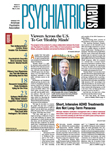More than 28 percent of the 72 million working-age people in the United States with chronic illnesses such as depression lived in households that struggled to pay their medical bills in 2007, according to the results of a national study released last month. And while the uninsured are particularly vulnerable, medical-bill problems are also growing among people with insurance and higher incomes.
The study was done by the Center for Studying Health System Change (HSC), a Washington, D.C., health policy research group.
The number of chronically ill people struggling with health care costs showed a “significant increase” from the 21 percent reporting such problems in the HSC's 2003 survey, according to the report.
Among the approximately 20 million chronically ill working-age adults living in households with medical-bill problems, 25 percent went without needed care. In addition, 50 percent delayed care, and 56 percent did not fill a drug prescription that had been written for them.
“The rising prevalence and increasing financial burden of chronic conditions mean more working-age Americans than ever are forgoing or delaying medical care because of concerns that they cannot afford treatment,” said Ha T. Tu, a senior health researcher at the HSC and coauthor of the study.
The 2007 Health Tracking Household Survey findings were based on a nationally representative survey of 4,300 working-age adults. The data were extrapolated for population estimates.
The survey also found that the overall prevalence of chronic conditions increased between 2003 and 2007. About 34 percent of working-age survey respondents in 2003 reported at least one chronic illness, while 39 percent of them, or an estimated 72 million people, had conditions such as diabetes, asthma, or depression in 2007.
Among uninsured people with chronic illnesses, 62 percent, or an estimated 5.7 million people, were in families that were unable to pay medical bills. The survey found that 38 percent of such people decided to forgo needed care, while 65 percent delayed care and 73 percent did not fill a prescription because of cost concerns.
Access to clinicians by working-age people with chronic illness also was identified as a challenge, even among people with insurance. Seventeen percent of such people with private insurance went without needed care, while 43 percent delayed care and 45 percent did not fill a prescription because of cost concerns.
While rates of access problems remained stable—at high levels—for the uninsured with medical debt between 2003 and 2007, unmet-need and delayed-care problems for the privately insured with medical debt increased significantly. The authors attributed the change to a trend among employers and insurers in that time to increase patient cost sharing.
The costs of treating chronic illness appeared to be increasingly borne by the public. In 2007 about 20 percent of working-age people with chronic conditions had public insurance, primarily Medicaid and Medicare, compared with 17 percent in 2003. The period saw commensurate declines in private coverage of people with chronic illness. The result was a “relatively stable” 13 percent rate of uninsurance among working-age people with chronic conditions.
HSC survey findings are posted at<www.hschange.org/CONTENT/1049>.▪
